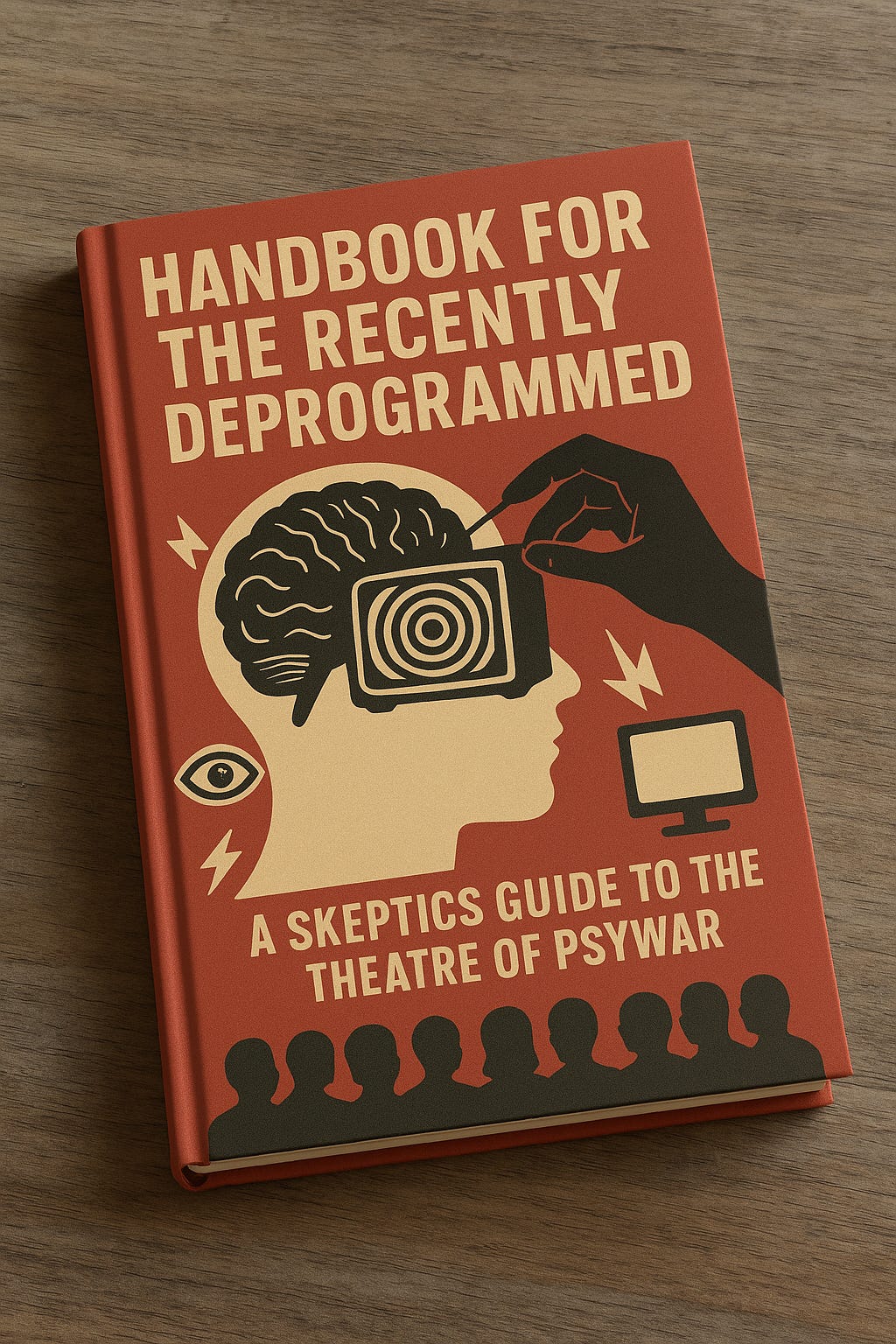Pre-Order: Handbook for the Recently Deprogrammed: A Skeptic's Guide to the Theatre of Psywar
Prints on 9/11/25
The new book will be published on Thursday.
I’m adding a few more infographics and converting more of it into video for the ongoing series The IPS Deprogram on Youtube: PLAYLIST
Pre-Orders are open until 9/11/25
(These will be Author signed copies. Limited availablity):
Description:
"Handbook for the Recently Deprogrammed: A Skeptic's Guide to the Theatre of Psywar" by Tim Ozman (2025)
This handbook, published under IPS (likely Infinite Plane Society or a related think tank), serves as a philosophical and practical guide to media skepticism in an era dominated by propaganda, psychological operations (psyops), and simulated events. Written by Tim Ozman, it positions itself as a tool for "deprogramming" individuals from passive acceptance of mass media narratives, which the author describes as a "modern religion" shaping a consensus "world stage"—a manufactured reality blending news, entertainment, and scripted events.
#### Core Concepts and Philosophy
- **Autohoaxing**: The central methodology. It's an "active process" of treating media-reported events (especially sensational ones like mass shootings, terrorist attacks, or disasters) as potentially fabricated or "fake until proven real." This flips the burden of proof onto the media, requiring evidence before acceptance. Autohoaxers are contrasted with "autobelievers," who default to trusting screens as windows to reality. The approach emphasizes "informed disbelief" over reflexive conspiracy theorizing, avoiding "rabbit trails" or "limited hangouts."
- **Epochē (Suspension of Judgment)**: Drawing from ancient Greek skepticism, the book advocates withholding judgment on controversial or unverified claims to achieve mental peace (ataraxia). In a "mind war" of constant media bombardment, rushing to react leads to emotional manipulation; pausing allows for clarity.
- **World Stage vs. Offworld Stage Perspective**:
- The "world stage" is the internalized, media-filtered worldview—a "closed system" of propaganda where news and entertainment merge into a "metascript" (a overarching narrative controlling dissent via controlled alternatives).
- The "offworld stage" is an external viewpoint of skepticism, rejecting the media's frame of reference. It treats history as "lies agreed upon" and psyops as theatrical performances, not real threats. This perspective avoids both mainstream "sheep" and alternative "anti-mainstream sheep," focusing on knowledge over belief.
- **Believers vs. Knowers**: Believers outsource thinking to media, filling knowledge gaps with faith or hearsay ("see-say" as visual hearsay). Knowers demand direct evidence, recognizing media as a "magic show" exploiting perceptual biases.
#### Key Themes and Sections
The book is structured in parts, blending critique, axioms, and glossary for practical application:
1. **Information Overload (Part I)**: Discusses how media drowns people in irrelevance (per Neil Postman), creating dependency. Introduces the "metaconspiracy"—conspiracies designed to control dissent—and distinguishes uninformed, misinformed, and informed individuals.
2. **The World Stage (Part II)**: Media as a "magic show" with predictive and concurrent programming (entertainment mirroring or foreshadowing psyops, e.g., Netflix series aligning with real-time events like train derailments or shootings). Scapegoats, martyrs, and simulated events maintain the illusion.
3. **None Dare Call It Hoax (Part III)**: Argues for "fake until proven real" if events are "fakeable" (via CGI, actors, etc.). Critiques "red pills" as alternative dogmas, false flags as guardrails hiding fakery, and promotes "reality scrutiny" over denialism.
4. **Frames of Reference (Part IV)**: Explores perceptual biases, MSM/MSM+/MSM- viewpoints (mainstream, conspiratorial additions, skeptical subtractions). Advocates shifting from hyper-mediated to self-mediated thinking, skepticism over incredulity.
5. **The Lie World Order (Part V)**: Hierarchical "programmers" manage perception in a closed system. Insiders vs. outsiders; encourages "going offworld stage" and think tanks to escape echo chambers.
6. **Introducing the Parallel Media (Part VI)**: Calls for a "culture of disbelief" and "parallel media" outside controlled opposition. Discusses mythmaking, "death clingers" (truthers insisting on real deaths in psyops), and reasonable doubt in autohoaxing (e.g., analyzing the 2024 Trump assassination attempt as staged).
7. **The Endarkenment vs. The Neo-Enlightenment (Part VII)**: Contrasts protective ignorance with paradigm shifts. Advocates "mentally off the grid" living, rejecting pro/anti dialectics for an "anti-anti" stance.
- **Appendix**: Includes a glossary (e.g., "truther-bait" as planted false leads), axioms (e.g., "fake until proven real," "video is not evidence"), quotes (from Orwell, Huxley, Bernays), and an afterword on ataraxia as ultimate freedom from media-induced anxiety.
#### Critiques and Insights
- **Media as Religion**: Mass media repackages sin, saviors, and demons into secular forms (e.g., climate change as a flood myth, nukes as god constructs). Psyops create "hyperstitions" (self-fulfilling beliefs via repetition).
- **Controlled Opposition**: Alternative media (MSM+) often reinforces the world stage by debating "who did it" instead of "did it happen?" False flags hide hoaxes; predictive programming isn't coincidence but coordinated propaganda.
- **Practical Advice**: Suspend judgment on unverifiable claims; question fakeability; avoid emotional investment in unproven events. No real deaths in psyops— they're simulations for propaganda.
- **Warnings**: Avoid "mind AIDS" (lack of mental immunity to viruses like superstitions); reject "truther bait" and rabbit trails.
The handbook isn't about adopting new beliefs but rejecting unvetted ones, promoting a knowledge-based worldview. It's dedicated to the IPS Think Tank and emphasizes "inactivism"—observing without reacting. At ~300 pages (based on contents), it's dense but actionable, with axioms for quick reference.
If this is an uploaded text file you'd like me to analyze further (e.g., extract specific sections, search for quotes, or compare to real-world events), provide more details! For instance, I could use tools like code_execution to parse it programmatically if needed, or web_search for related discussions on concepts like "autohoaxing."


